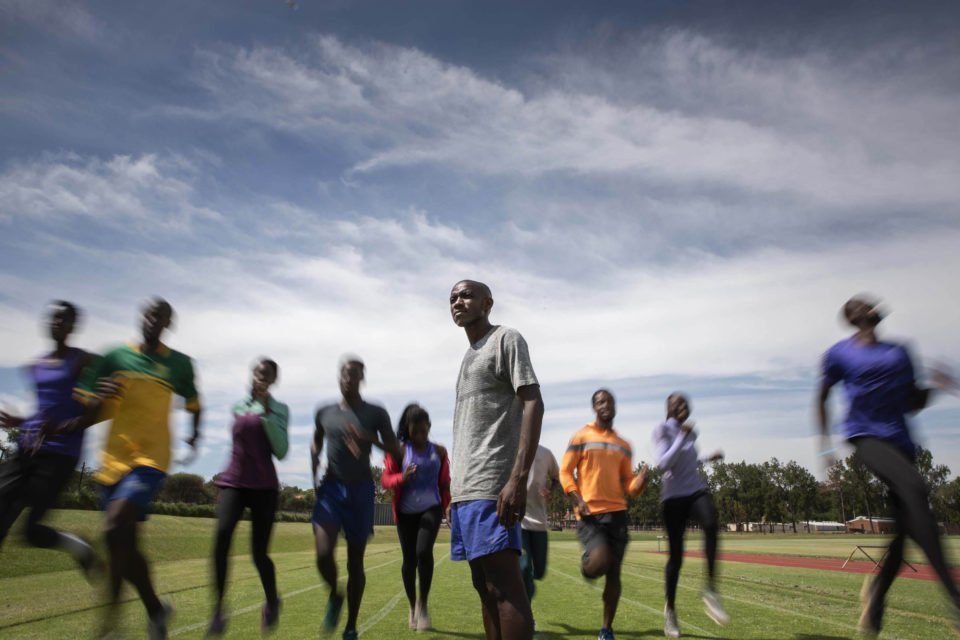Sepeng’s journey to top SA coach
He dreamt of being an Olympic medallist like his brother Hezekiél, but the running world had other plans for Samuel Sepeng.
Author:
26 December 2018

A career that did not emerge from the shadow of his brother’s illustrious achievements is the reason why Samuel Sepeng is already a decorated coach at just 31. Growing up in the small town of Potchefstroom in North West, Sepeng didn’t have to look too far for a role model and inspiration – his older brother Hezekiél was already a living legend.
Hezekiél, who is 13 years Samuel’s senior, burst onto the global athletics scene as a teenager at the 1993 World Championships in Stuttgart, Germany. From then on, he became a South African hero and international great in 800m having won a historic silver medal in an iconic come-from-behind at the 1996 Atlanta Olympic Games in the United States. That silver medal not only made him the first South African to medal at the Games since 1928, it also made him the first black athlete to do so. He also won two Commonwealth Games silver medals in 1994 and 1998.
Related article:
Throw in the South African 800m record of 1:42.69, which still stands despite the best efforts of the late 2000 Athens Olympic Games gold medallist, Mbulaeni Mulaudzi, and Hezekiél’s legacy as a game-changer in South African athletics is complete, despite him missing gold.
In contrast, Samuel, who naturally would have loved to emulate his older brother, was held back by a restrictive personal best of 1:48.81, leaving him to endure life as a rabbit on the European circuit, setting the pace for the world’s elite.
‘I choked’
When asked why he didn’t quite live up to his brother’s standards in the 800m, Sepeng gives an answer that explains how and why he emerged from his greatest disappointment to become a great coach. “In one sense I would say I choked because of the pressure of having a good athlete for a brother. But on the other hand, I think it was [because of] my development. As a young person I wanted to do as well as he did, but while the training was good, the [gradual] development wasn’t.”
Despite the considerable age gap between the two brothers, Samuel began by doing the same workouts as his brother. “I was still young and training with my brother – a 1.42 athlete – which was suicide for someone my age. I was on the wrong programme for my age and it took me forever to break 1.50, whereas in training you could see I was at least a 1.46 runner.
“I could keep up with my brother in training but because I was too young I’d be too tired when the race came. There was a coach from England who advised me to focus on breaking 1.50 by training for 1.49, instead of pushing for 1.45, and it worked,” says Sepeng.
As a coach who mentored athletics superstar Caster Semenya for a season before being voted Coach of the Year at the 2018 SA Sports Awards, Sepeng applies the lessons he learnt as an athlete in his new trade. “When I did that I could understand the conditioning of my body, its structure and that getting from 1.52 to 1.45 was something you did gradually and not pushing yourself at once. When I look back at the mistakes I’ve made it’s helped me with the athletes I work with because you get different 800m runners, you get speed runners, strength runners, power runners and you have to work with them accordingly.”
Pacing and learning
Sepeng’s career as a pacesetter – which has contributed to the successes of Britain’s Kelly Holmes, Botswana’s Nijel Amos and Semenya when their training base was in Potchefstroom – has come in handy now that he is a coach. “For me, it all started with the pacing because as an athlete you have to know how to judge the pace,” he says. “I can draw from the past and all the people I’ve paced for because I learnt from all of them. For me it wasn’t just about pacing, it was about pacing and learning.”
At his age, Sepeng’s advantage over other coaches, most of whom can merely wave a stopwatch and bark instructions, is that he can still pace his athletes. “I work with them every morning on things like jogging, fartlek (interval training). Whatever we do, I’m with them. If I tell them I want a certain pace I have to show them. As a young coach I can still do it, so that’s what I do.
Related article:
“It starts with friendship, to get them believing. And I know the way an athlete’s mind works: they push themselves for the coach not to beat them. So it works for me because there will be a time when I can no longer push myself like that,” he says.
For the time being, not only is he a coach who can run with his athletes, he’s also the youngest Coach of the Year doing the rounds, something he sees as a solid foundation for the rest of his coaching career. “I wouldn’t say it’s happened too early for me because I started with Caster in 2015 as an assistant coach, and I learnt a lot from being an assistant coach about the responsibility of working with athletes and how to work with them.”
Swapping Potch for Caster
The Coach of the Year award also vindicated his decision late last year to uproot himself from his family – wife Alina, and sons Thato and Paballo – and his job as junior coordinator in the marketing department at North-West University to follow Semenya back to Pretoria.
“I grew up in Potch and my life was in Potch. To be honest, when I got the job at the university I didn’t see myself leaving. But working with Caster gave me the opportunity of working as head coach and meant the sacrifice of leaving Potch. I had to ask myself what I wanted in life, what my dream was and what my goal was.
“Whatever I’d achieved in the past had been about following in the footsteps of my brother. I’d also seen myself winning medals at Olympics and travelling the world as an athlete. But the opportunity of taking over as Caster’s head coach from Mr [Jean] Verster felt more like the way to make those things happen through my athletes,” says Sepeng.
Related article:
His ability to judge pace in training has extended to a freakish habit of predicting his athletes’ times, the case in point being Semenya’s new personal bests of 1:54.25 in the two-lap race and 3:59.92 in the metric mile in an unbeaten year in the former event.
Lately, he and his star athlete (his other athletes are current South African men’s 800m champ Tshepo Tshiite and Botswana’s Boitumelo Masilo) are thinking about Jarmila Kratochvilová’s 35-year-old women’s world record of 1:53.28. “It will happen. If you take the planning and the training of this year, we said we’d do 1.54 this year and we did it, so why not 1.53?”
That confidence mirrors none of the angst felt by most South African athletics fans about how long Semenya can continue to dominate middle-distance events. This after the decision by the IAAF, the world athletics governing body, to rewrite the rules of eligibility for certain women’s events based on testosterone levels – a call which could exclude Semenya from competing if ratified.
Sepeng’s response? “We focus on what we can do, what we can change. So we’ll focus on our work and what we can do.”
Spoken like a true coach.



